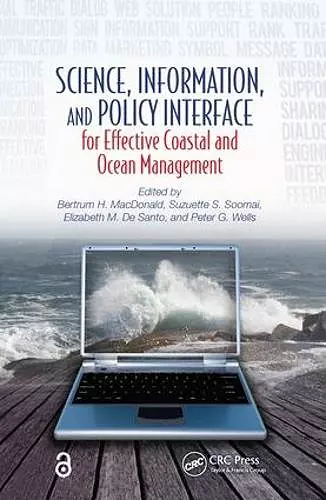Science, Information, and Policy Interface for Effective Coastal and Ocean Management
Bertrum H MacDonald editor Suzuette S Soomai editor Elizabeth M De Santo editor Peter G Wells editor
Format:Hardback
Publisher:Taylor & Francis Inc
Published:6th May '16
Currently unavailable, and unfortunately no date known when it will be back
This hardback is available in another edition too:
- Paperback£57.99(9781138490833)

This book provides a timely analysis of the role that information—particularly scientific information—plays in the policy-making and decision-making processes in coastal and ocean management. It includes contributions from global experts in marine environmental science, marine policy, fisheries, public policy and administration, resource management, risk management, and information management.
The book is divided into four sections that provide focused analyses, including
- An overview of the characteristics of the science–policy interface, including a discussion of the role of scientific information in policy making and an argument that the term "science–policy interface" is inaccurate due to the existence of many possible interfaces
- Descriptions of fundamental concepts and principles for understanding the role of information in effective integrated coastal and ocean management
- National and international case studies that illustrate key factors in successful science–policy interfaces, such as awareness, communication, and use of information
- Critical issues and future research challenges
The book also explores the different types of science–policy interfaces existing within and between different organizations, as well as the various roles that different types of non-governmental organizations play in producing and disseminating information.
Science, Information, and Policy Interface for Effective Coastal and Ocean Management presents a wealth of knowledge that enhances current best practices to achieve more effective communication and use of marine environmental information. Useful to all major groups in the policy-making process, from senior policy- and decision-makers to practitioners in coastal and ocean management, it helps to increase understanding of catalysts and barriers to communicating research findings. It also serves as a starting point for further research and progress in efficient marine environment management.
The Open Access version of this book, available at https://doi.org/10.1201/b21483, has been made available under a Creative Commons Attribution-Non Commercial-No Derivatives 4.0 license.
"This volume will be of great use to the growing numbers of ocean practitioners from all sectors, dedicated to improving the health and sustainability of our oceans, for generations to come."
—Michael H. Depledge, University of Exeter Medical School, from the Foreword
"Although there is international acceptance of the need for integrated coastal and ocean management (ICOM), this book demonstrates that increased scientific understanding of these environments does not necessarily lead to better policy making. This book is unique in that it examines the diversity of actors and factors bridging the science–policy interface, such as the inclusion of both gray and primary literature, different forms of knowledge, information brokers, boundary organizations, different levels of decision makers, governance structures, and politics."
—Nick Harvey, University of Adelaide
"Global coastal systems are among the dynamic and complex environments humans engage. This volume takes on a rare and broad-ranging view of how science and information can be used to more effectively and sustainably manage these essential places. It is a welcome contribution to the literature during a period of great social vulnerability to global environmental change. The authors lucidly articulate contextual and conceptual frameworks to better understand the science–policy interface in the early pages of the book. Then, to expand and solidify the value of the book, they build a series of case-based analyses for clarity of argument. This volume is of great value to those working at the science–policy interface generally and the coastal systems change in particular."
—Robert E. Bowen, University of Massachusetts
"This book will be useful to all major groups in the policy-making process, including senior policy makers and decision makers, policy advisors, resource managers, information managers, scientists and other practitioners in coastal and ocean management. The authors have wisely dedicated this book to the new generation of professionals involved in the challenging task of managing our coastal and ocean spaces for future generations. It adds substantially to the growing body of research literature on the science–policy interface and I recommend this important volume to the new generation of ‘information brokers’ who occupy the space between science and policy and build bridges of communication and understanding."
—Lawrence Hildebrand, World Maritime University
"This book is a must-read for both practitioners and scholars of science–policy interaction in ocean politics, and will also be a useful reference point beyond this domain for the entire field of global environmental governance."
—Frank Biermann, Utrecht University and Earth System Governance Project
"This book addresses how to communicate scientific information to policy makers so that it can be used most effectively in decision making and ultimately to improve the sustainability of human activities in the ocean. The theme, Integrated Coastal and Ocean Management (ICOM), encapsulates the broader systems-based approach that is required to solve the complex problems faced in the oceans today that derive from multiple stressors and may involve many sectors. As a scientist who has often worked on the interface of knowledge and policy I found I recognized many of the themes picked up in this book. It is a tremendously valuable contribution to advancing sustainable management and conservation of the ocean and will be of use to marine scientists, students who have an interest in applying their work and knowledge to real problems, and to the governance and NGO community, whether they wish to make better use of science in policy development or whether they want to get others to make use of such information."
—Alex David Rogers, University of Oxford
"Is the book worth reading? I certainly think so. The case studies are interesting and illustrate theoretical concepts put forward in the book quite well. Researchers looking for inspiration will find this book invaluable. The book will be equally interesting for decision makers."
—Integrated Environmental Assessment and Management, January 2017
ISBN: 9781498731706
Dimensions: unknown
Weight: 839g
512 pages